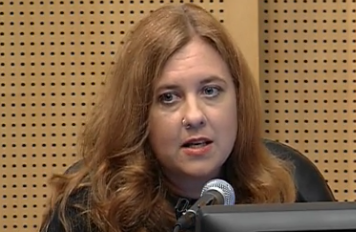It's Still an 8-1 City Council

It’s still an 8-to-1 council.
The new-look city council took its first high profile policy vote yesterday. The question on the floor was whether to grant Amazon an “alley vacation”— which is city hall speak for giving city-owned, street right of way to a private company. Amazon wanted the alley vacation to complete development of two office towers in the Denny Triangle just southwest of Denny Park. The property in question is between 8th Ave. and 7th Ave. and Bell St and Blanchard St.
The project has been hounded by labor complaints against Amazon’s security subcontractor, concerns over free speech rights in a “Privately Owned Public Space (POPS)” that is part of the redevelopment (a plaza in between the towers) and the basic existential angst that comes with any Amazon expansion.
Developments seeking “alley vacations” must provide “public benefits” in return—including money and public amenities. In this instance, Amazon is, for example, paying an estimated $4.8 million for the right of way itself, $8.3 million in affordable housing and childcare, doing landscape, pedestrian, and bike upgrades, including protected, elevated bike lanes on 7th Avenue and Bell Street, and building a 12,000 square foot public plaza between the 8th Avenue hill climb flowing to 7th Ave in sort of a Z shape.

Herbold Makes Good on Licata’s Free Speech Legacy
Now-retired city council member Nick Licata raised the free speech issues in the transportation committee last December, proposing an amendment to guarantee free speech in the public plaza. In a divided 4-1 committee vote, Licata ended up voting against the “alley vacation” because his language explicitly mandating free speech rights, such as handing out leaflets, signature gathering, and holding signs, was not spelled out in the legislation. In the divided report, Licata, the lone no vote against Sally Bagshaw, Tim Burgess, then-transportation-committee chair and now-retired council member Tom Rasmussen, now-retired council member Jean Godden, wrote:
The Council has heard that people exercising their First Amendment rights to protest have been evicted from public plazas created through the street vacation process. Adding this language to the conditions for this street vacation would align our street vacation approval with our Downtown Amenity Standards and would clarify that when public spaces are created as a result of street and alley vacations, that the public has all rights to use them for First Amendment activities. Because we are not explicitly or affirmatively preserving these rights, I cannot support this vacation.
Licata’s former staffer and now District One (West Seattle, South Park) council member Lisa Herbold, along with Burgess and new at-large city council member Lorena González, amended the legislation at yesterday’s full council meeting with language explicitly guaranteeing the type of free speech Licata outlined— plus mandating signage that spelled out those guaranteed rights. The amendment also specified that the public would have access to the space 24 hours a day and that the city would have enforcement authority when there are complaints of First Amendment violations.
Herbold, who added the 24-hour provision and the signage provision (her boss Licata had championed legislation originally mandating POPS signs that simply identified POPS around the city) said: “providing signage for these spaces is really important if you want to see good, active use.”
The free speech amendment passed unanimously, with new planning committee chair, Rob Johnson, cheering the amendment, noting that he’d been “booted” from a supposedly public space. (Johnson explained after the meeting that last summer he was on the Russell Investments 17th floor open space terrace, a POPS he knew about thanks to Licata, talking on his phone. “A security officer asked me to show my badge,” Johnson remembers, “and when I told him I didn’t have one, he kicked me out. I told him that it was a public space, he said it wasn’t, and I was escorted to the lobby.” UPDATE: Bryan Stevens, spokesman for the city's Department of Construction and Inspection, says there has been some confusion about the Russell building and that the terrace is actually only supposed to be available to anyone who works in the building, but not to the general public.)
Herbold (For the Win) Bests Sawant on Addressing Workers Rights

Several employees from Amazon’s security contractors, Security Industry Specialists (SIS), testified at the hearing before yesterday's vote condemning Amazon for union busting bullying. Labor standards aren’t currently a legally germane issue when it comes to granting city of right of way, but it’s an issue that came to the forefront as the company was looking for favors from the city to develop the new office towers. And the workers’ testimony first drew dramatic comments from council member Mike O’Brien. Acknowledging that the council didn’t have the authority to demand labor concessions in exchange for “alley vacations,” O’Brien, who's been a dissident on Amazon/Vulcan street vacation requests in the past, did say the city was “revisiting that policy going forward”; at council’s request late last year, O’Brien explained, the Seattle Department of Transportation (which oversees street vacations) is reviewing the guidelines with a wider lens on what kinds of public benefits the public is looking for in the future.
And that was his segue for this: “I wanted to take a second to talk about and ongoing labor dispute that’s happening at Amazon and how disappointed I am that a company like Amazon…is contributing to a race to the bottom for its contracted security workers.”
Name checking SIS, Amazon’s subcontractor, O’Brien said: “This is the kind of company, [that] the way they’re behaving now, should have no place in Seattle.” Noting 15 paid sick leave complaints against SIS [since settled with the city’s office of civil rights] and federal labor complaints as well, O’Brien continued: “For a company like Amazon that is such a high profile, successful business in our community, someone that all of us want to be pointing to as the example of what Seattle businesses do, I think Amazon can do better. And frankly it’s been appalling to me that they’ve continued to absolve themselves of the responsibility and say that this is merely on SIS."
O'Brien, resigned to the fact that the current alley vacation process didn't provide an opportunity to govern labor practices, eventually voted yes on the legislation. But he did saying his vote came with a major footnote that: the next time Amazon or any other business comes to the council to ask for one, the rules will be different.
"There’s an opportunity here to demonstrate that a city that’s becoming a city of tech workers can also be one that supports those that serve them their coffee and manage the office buildings … That’s why I think it’s more important than ever that we carefully think about the future of public benefits that are provided for any deal that sees public right of way becoming privatized…and take steps to demonstrate to the community that [Amazon] is going to be a high-road employer for all workers and not just the WalMart in the sky.”
Socialist council member Kshama Sawant took it from there. She said O’Brien’s comments provided “a clear rationale for taking [the bill] back to committee,” and said “council members can talk about changing the process, but…unless we use our position on bills like this one to hold big business accountable than it is just words.” Noting that some of her colleagues had gotten contributions from Amazon, she said it was impossible for council members to represent both big business and workers at the same time, and that they “have to pick a side.” Highlighting SIS’s labor abuses and saying “Amazon is willfully turning a blind eye…outsourc[ing] their security guards to avoid [giving workers] their democratic right to a union and making it easier to oppress workers,” Sawant concluded that the legislation should be sent back to the drawing board. “Because Amazon.com didn’t want to be bothered, council members, many of whom have taken corporate donations and have a long track record of standing up for corporations against workers’ interests, have indicated a willingness to give Amazon a smooth passage. I have no divided loyalties and if council members are not willing to send this back to the transportation committee to be properly discussed than I do intend to vote no. That would have been a good opportunity for the council to do its job.”
It was a righteous speech, but Herbold, who spoke next, said “a more appropriate” way to address the labor issues at SIS already existed. Herbold said she had spoken with Amazon last week and learned that they had done an audit of SIS’s employment practices. Herbold wanted Amazon to make the audit public (deftly making the existence of the audit itself public was a canny first step), and she reminded her colleagues that council had passed legislation last year giving the city’s office of labor standards and office of civil rights the authority to take proactive measures to enforce labor laws.
In other words, they didn’t need the alley vacation to address complaints about Amazon and SIS right now. They could look into Amazon’s labor record and take action with existing authority.
While Sawant cast the lone no vote against the alley vacation, Herbold joined the rest of the council, and voted to get the affordable housing dollars, green space, raised bike lanes, hill climb, street setbacks, and 1st Amendment-safe public plaza in exchange for an alley.
By the way, regarding those Amazon donations. Here are the numbers, including plenty of Amazon money going Sawant's way:
Burgess, González, Harrell, Jonson, and Debora Juarez were the only candidates to get contributions (all at the $700 max) from the company itself. Burgess also got $700 total from two Amazon employees, an attorney and an engineer (urbanist Ben Schiendelman, actually.) González also got one $200 contribution from an Amazon human resources staffer. Johnson got $90 from one Amazon manager. Amazon also contributed $25,000 to the chamber’s political committee, which in turn, contributed the $700 maximum to Bagshaw, Burgess, Gonzalez, Harrell, and Johnson. The chamber also gave big to a pro-Burgess independent expenditure ($150,000) and a pro-Johnson independent expenditure ($47,000).
Meanwhile, Bagshaw got $350 total from two different Amazon engineers.
Herbold got $650 total from two different Amazon employees, a manager and an engineer.
And Sawant herself got $2,840 total from six different Amazon employees including a general manager, programmers, an attorney, and a designer.
Amazon also contributed $25,000 to last year’s successful transportation measure.




